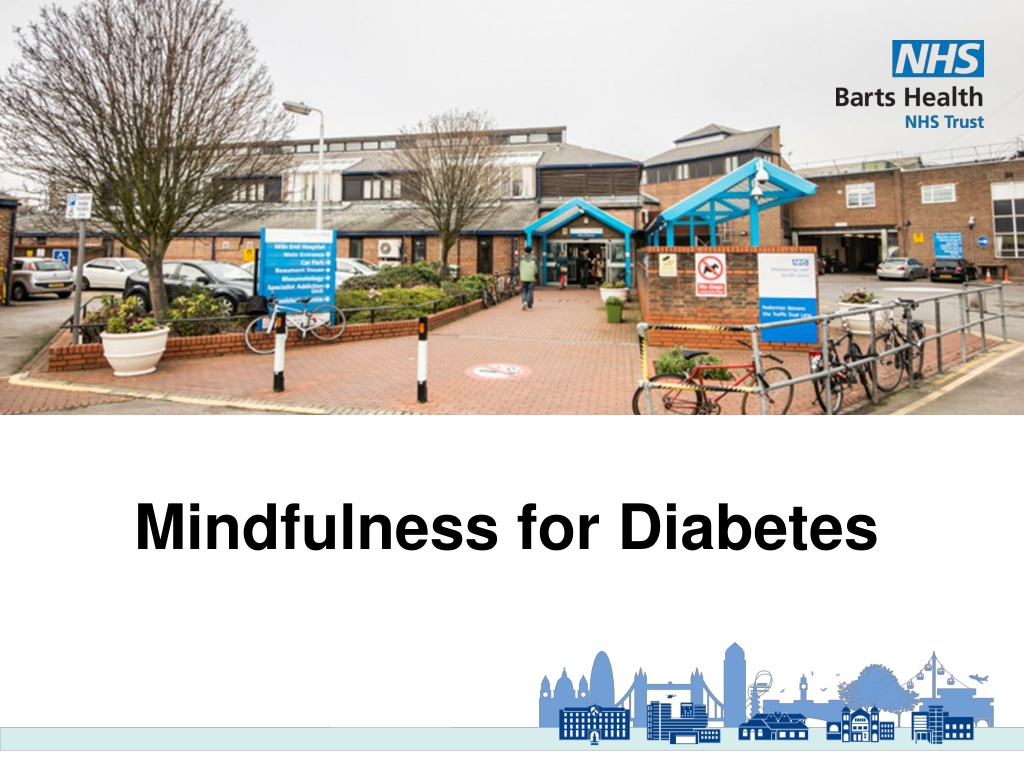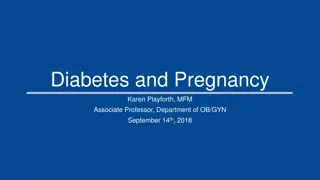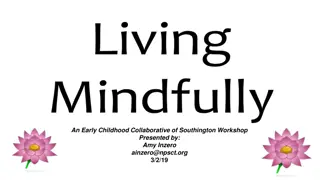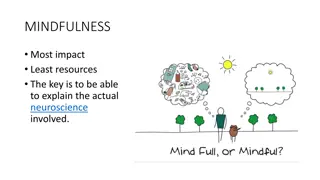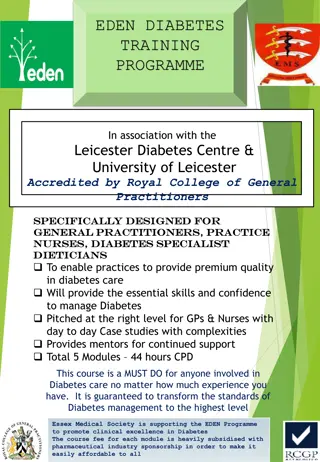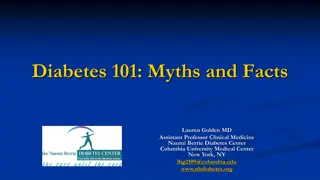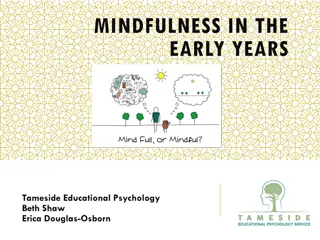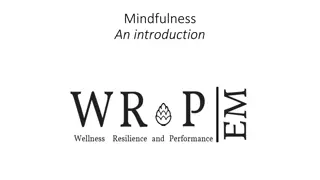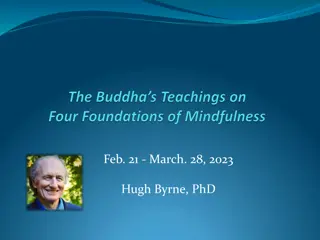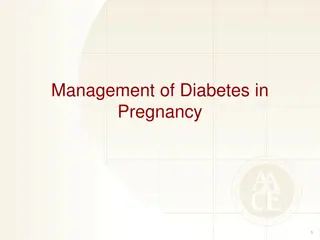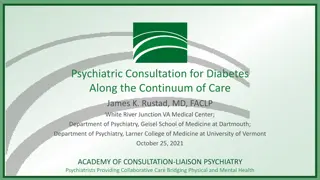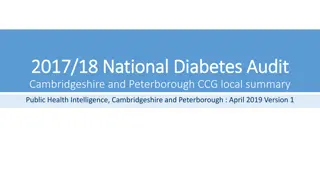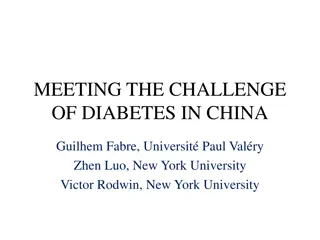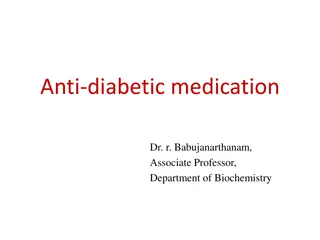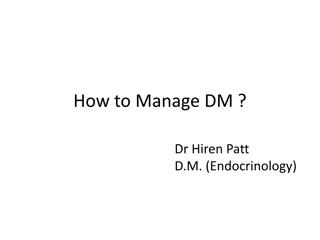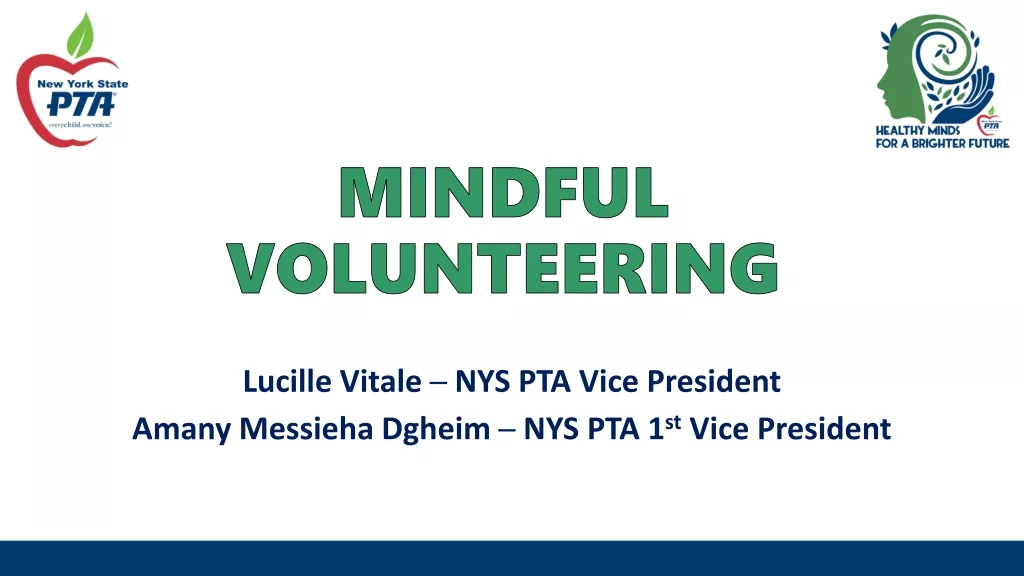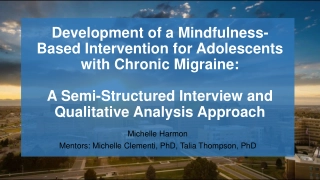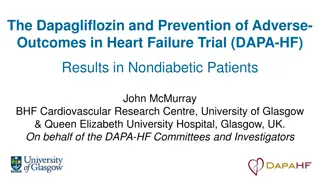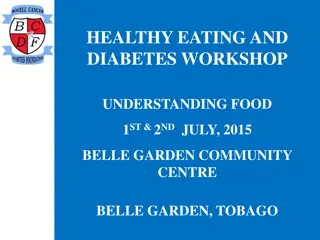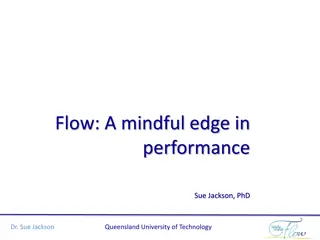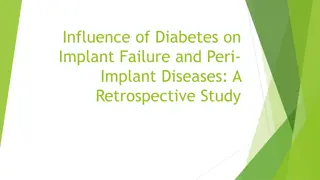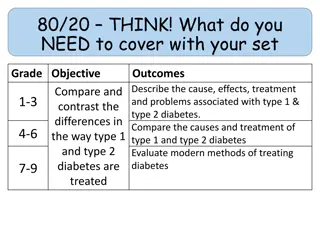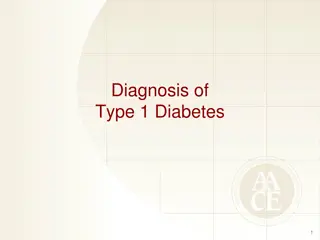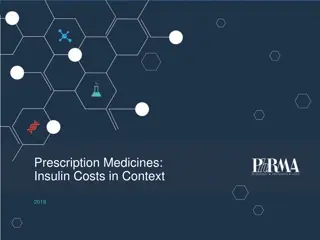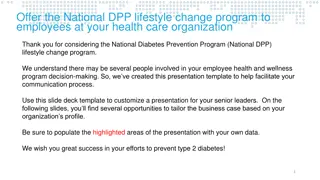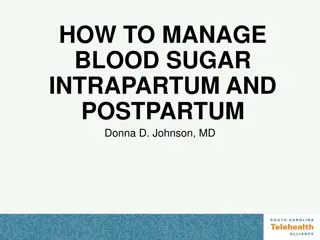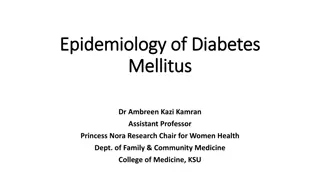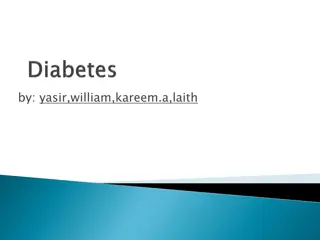Mindfulness for Diabetes Workshop: Exploring Benefits and Practices
Dr. Sonya Frearson, a clinical psychologist, leads a workshop on mindfulness for diabetes, aiming to delve into the experiential exploration of mindfulness meditation and its role in managing long-term health conditions, particularly diabetes. The session focuses on understanding the principles of mindfulness, its relevance in healthcare, and the positive impact it can have on physical and mental well-being, as supported by research findings. Attendees are encouraged to engage in mindful eating exercises and learn about the physical health benefits associated with meditation practices.
Download Presentation

Please find below an Image/Link to download the presentation.
The content on the website is provided AS IS for your information and personal use only. It may not be sold, licensed, or shared on other websites without obtaining consent from the author. Download presentation by click this link. If you encounter any issues during the download, it is possible that the publisher has removed the file from their server.
E N D
Presentation Transcript
Facilitator: Dr Sonya Frearson Clinical Psychologist for People Living with Diabetes (Tower Hamlets population) Tues, Weds & Fri - Consultant Clinical Psychologist at St Mark s Hospital (gastroenterology) Mon & Thurs
Hopes for Workshop For us to explore mindfulness meditation experientially together To explore why mindfulness may help people living with long term health conditions How have I been using mindfulness with people living with diabetes in Tower Hamlets since 2008?
Show of hands Who hasn t heard of mindfulness before?
Mindfulness paying attention in a particular way: in the present moment, on purpose and non- judgementally Jon Kabat-Zinn
Show of hands Who has a regular meditation, yoga or tai chi practice?
Mental Health Foundation Mindfulness report (2010) Summarises evidence for mindfulness-based approaches Recommendations for service development, training and research Survey of GPs: majority believe mindfulness training would be helpful for their patients and themselves 26% of British adults surveyed practice meditation, although 12% only rarely
So lets try it! Mindful Eating
Physical Health & Mindfulness Mindfulness-based approaches have been widely applied to physical health problems There s a lot of research evidence Here are some highlights
Physical Health Benefits of Meditation People who meditate visit their GP half as often as those who don t (Orme-Johnson, 1987) Meditation practices increase blood flow, reduce blood pressure & reduce the risk of dying of cardiovascular disease (Nataraja, 2008; Sharma, 2008)
Mindfulness and medical problems MBSR was developed for people with chronic medical problems Accesses core of being, whole despite physical problems Kabat-Zinn et al s RCT with 37 psoriasis patients (1998) Meditation instructions in light booth speeded response Provides way of changing relationship to symptoms Emphasis on integrated awareness of body and mind Attention to thoughts as thoughts and sensations as sensations may disrupt unhelpful cycles of interactions between physiological events and cognitions Increased awareness of illness behaviour which may have previously followed automatically from symptoms Balance between acceptance of current situation and mindful action towards change
Mindfulness & immune system Davidson et al (2003): With healthy employees - 25 took part in Mindfulness-Based Stress Reduction (MBSR), 16 Wait List Controls Vaccinated with flu virus at end of 8-week programme MBSR group showed better immune response
Evidence for mindfulness-based approaches Hofmann et al s (2010) meta-analysis based on 39 studies totalling 1,140 participants receiving mindfulness-based therapy Range of conditions, including cancer, generalized anxiety disorder, depression, and other psychiatric or medical conditions Robust effect sizes 0.63 for anxiety and 0.59 for mood symptoms in the overall sample 0.97 and 0.95 in patients with anxiety and mood disorders
What might explain benefits? Exposure and desensitisation Recognition of thoughts as thoughts, not reality Increased awareness of cognitive processes Disengagement from rumination Kinder, more accepting awareness of self Reduced avoidance of negative experience Not persistently trying to solve the insoluble More effective self-management Relaxation (Baer, 2003; Smith, 2004a; Teasdale et al, 2000)
Empirical findings regarding mechanisms Fewer cognitive failures and greater attention to external triggers (Herndon, 2008) Decreased rumination and fear of emotion, and increased behavioral self-regulation (Lykins and Baer, 2009) The body scan is associated with changes in cardiac rhythm not found with progressive muscle relaxation or other relaxing activities (Ditto et al, 2006) Mindfulness training increases pain tolerance (Kingston et al, 2007) Dampens cycles of somatic anxiety symptoms and worry (Vujanovic et al, 2007) Improves capacity to orient attention, which may reduce hypervigilance (Jha et al, 2007)
Mindfulness for People Living with Diabetes Frearson et al (2006)
Uncontrolled Diabetes Complications of Diabetes Control & Responsibility Unhelpful coping strategies Avoidance Procrastination Anger Anxiety, Guilt, Shame Self-Blame
Setting Conditions Medical Management Parental Management Loss of control over body Emotional Style Core Beliefs I am defective My body will let me down I have no control The world is not fair! Other people want to control me Rules for Living Coping Strategies Triggering Event: Determined Non- Striving: Engaging (not avoiding) Progression I will do what I am able to Development Acceptance Relationships I will change what I can and relinquish control of that which I cannot Compassion
Summary of Intervention Components Week 1 Introductions, group boundaries, hopes & fears, Mindful Eating, mindfulness of activity Body Scan & Introduction to CBT 2 3 Mindful Standing & Sitting 4 Mindful sitting (working with thoughts & feelings), Breathing space Mindful Sitting, Loving Kindness 5 6 Mindful Sitting, Coping with stress, ill health etc, Coping space Walking Meditation, Applying mindfulness to diabetes self- care, coping space Mindful eating, hopes & fears revisited, keeping it going 7 8
Evaluation Pilot study combining quantitative & qualitative measures Mixed Methodology 1. 2. 3. 4. Research Questions: Is mindfulness for diabetes acceptable to PLWD? How do PLWD find it helpful? What difficulties or drawbacks do they notice? Is the intervention feasible in our clinic setting?
Participants 9 people completed the intervention (2 men) Mean age 47 years 4 Type 2 diabetes; 5 Type 1 diabetes 4 had never tried meditation, tai chi or yoga before. 6 non-completers
Procedure Measures were filled in Week 1 & 8. There were also weekly measures of mood and evaluation of the session. A focus group was held at week 9. Thematic Analysis; validity check Testimonial Validity Check
Quantitative Measures HADS hospital Anxiety and Depression Scale Problem Areas in Diabetes (PAID) Summary of Self-Care in Diabetes MAAS Mindful Attention & Awareness Scale Self-Compassion Scale WHO-5 Well-Being Index (Weekly measure) HAT - Helpful Aspects of Therapy Form (Weekly measure)
Quantitative Results N = 9 , descriptive analysis only No change on anxiety & depression measures Small weekly increase in well-being which plateaued out No real change on diabetes self-care inventory Slight increase in mindfulness & self compassion Marked decrease in diabetes related distress
Qualitative Research Questions Was the intervention beneficial? What were the benefits? How did the benefits come about? Were there any negatives to taking part?
The Benefits Thematic categories: Calming Helps you cope with emotions (anxiety, anger, fear) Increased self-compassion Developing an awareness of your problematic coping strategies Practice tapes cured insomnia!
Diabetes Specific Benefits Reported lower blood sugars or lower HbA1c Increased diabetes self-care Better coping with Pain Emotional: o Identifying feelings about diabetes o Relating differently to diabetes o Less guilt when get off track with diabetes tasks
Negatives? Filling in research questionnaires Feeling self-conscious in the group Being distressed in group but seen as a positive part of my spiritual journey Some exercises weren t for everyone e.g. Mindful eating
How did the benefits come about? Reversed strategies of avoiding diabetes (approaching thoughts and feelings; acceptance) Being mindful of breath enabled endurance of painful procedures Coping with anger using wise mind (opening up different ways to respond) Mindful breathing reversed panic symptoms Acceptance of worrying lessen worry Self-compassion Realising you are a perfectionist Feeling less guilty Another tool to control diabetes
Quotes Avoidance: I mean it was extraordinary to see how similar we are and to find out how much, all the techniques we use to avoid thinking about diabetes or you know, to sort of you know, pretend you don t have it or just be so enraged about it, you know. All the hard work that you put into not dealing with diabetes or not dealing with the condition, and the energy we waste
Acceptance I ve got to learn to cope with it as it is, not as I want it to be. Diabetes is never going to be as I want it to be It s more about acceptance than sort of battling, and you know part of me likes that. You know, it s quite a relief in a way
Self-Compassion I think diabetes is a nightmare for somebody like me who likes to get things done, or get things finished, and do things properly, because it s so you can t get hold of it, ever. And I think the mindfulness is well I m beginning to see that it s a way of taking a more sort of kinder, kind of whole approach to one s outlook
Diabetes & Perfectionism well , I think it s about not being so strict, not being so punishing to yourself if things go wrong you know that thing about it s ok ? It s ok because sometimes it won t go right, sometimes you will get high levels of blood sugar, an awful day or an awful year and you ll be sick to death of it. But you can you know, not to give up because you can t achieve perfection, you just try. And come back to it again, start again
Guilt in a way to be aware that wouldn t it be simpler just to do these things [diabetes self-care tasks]? And when you do like get good results, the burden, the guilt that s lifted, it s just extraordinary!
Mindfulness for Diabetes in Tower Hamlets Since 2008 I ve run 10 full mindfulness courses (9 as evening groups) and an on going graduates practice group. 2020 first Mindful eating group for T2 (had to be virtual) Supervised & supervising 2 further PhD studies into mindfulness for diabetes.
What will you take away from todays session?
